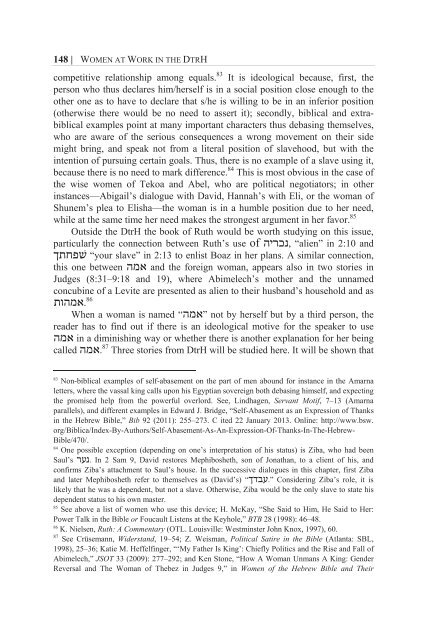Women at Work in the Deuteronomistic History - International Voices ...
Women at Work in the Deuteronomistic History - International Voices ...
Women at Work in the Deuteronomistic History - International Voices ...
Create successful ePaper yourself
Turn your PDF publications into a flip-book with our unique Google optimized e-Paper software.
148 | WOMEN AT WORK IN THE DTRH<br />
competitive rel<strong>at</strong>ionship among equals. 83 It is ideological because, first, <strong>the</strong><br />
person who thus declares him/herself is <strong>in</strong> a social position close enough to <strong>the</strong><br />
o<strong>the</strong>r one as to have to declare th<strong>at</strong> s/he is will<strong>in</strong>g to be <strong>in</strong> an <strong>in</strong>ferior position<br />
(o<strong>the</strong>rwise <strong>the</strong>re would be no need to assert it); secondly, biblical and extrabiblical<br />
examples po<strong>in</strong>t <strong>at</strong> many important characters thus debas<strong>in</strong>g <strong>the</strong>mselves,<br />
who are aware of <strong>the</strong> serious consequences a wrong movement on <strong>the</strong>ir side<br />
might br<strong>in</strong>g, and speak not from a literal position of slavehood, but with <strong>the</strong><br />
<strong>in</strong>tention of pursu<strong>in</strong>g certa<strong>in</strong> goals. Thus, <strong>the</strong>re is no example of a slave us<strong>in</strong>g it,<br />
because <strong>the</strong>re is no need to mark difference. 84 This is most obvious <strong>in</strong> <strong>the</strong> case of<br />
<strong>the</strong> wise women of Tekoa and Abel, who are political negoti<strong>at</strong>ors; <strong>in</strong> o<strong>the</strong>r<br />
<strong>in</strong>stances—Abigail’s dialogue with David, Hannah’s with Eli, or <strong>the</strong> woman of<br />
Shunem’s plea to Elisha—<strong>the</strong> woman is <strong>in</strong> a humble position due to her need,<br />
while <strong>at</strong> <strong>the</strong> same time her need makes <strong>the</strong> strongest argument <strong>in</strong> her favor. 85<br />
Outside <strong>the</strong> DtrH <strong>the</strong> book of Ruth would be worth study<strong>in</strong>g on this issue,<br />
particularly <strong>the</strong> connection between Ruth’s use of הירכנ,<br />
“alien” <strong>in</strong> 2:10 and<br />
ךתחפשׁ “your slave” <strong>in</strong> 2:13 to enlist Boaz <strong>in</strong> her plans. A similar connection,<br />
this one between המא and <strong>the</strong> foreign woman, appears also <strong>in</strong> two stories <strong>in</strong><br />
Judges (8:31–9:18 and 19), where Abimelech’s mo<strong>the</strong>r and <strong>the</strong> unnamed<br />
concub<strong>in</strong>e of a Levite are presented as alien to <strong>the</strong>ir husband’s household and as<br />
תוהמא. 86<br />
When a woman is named “המא” not by herself but by a third person, <strong>the</strong><br />
reader has to f<strong>in</strong>d out if <strong>the</strong>re is an ideological motive for <strong>the</strong> speaker to use<br />
המא <strong>in</strong> a dim<strong>in</strong>ish<strong>in</strong>g way or whe<strong>the</strong>r <strong>the</strong>re is ano<strong>the</strong>r explan<strong>at</strong>ion for her be<strong>in</strong>g<br />
called המא. 87 Three stories from DtrH will be studied here. It will be shown th<strong>at</strong><br />
83 Non-biblical examples of self-abasement on <strong>the</strong> part of men abound for <strong>in</strong>stance <strong>in</strong> <strong>the</strong> Amarna<br />
letters, where <strong>the</strong> vassal k<strong>in</strong>g calls upon his Egyptian sovereign both debas<strong>in</strong>g himself, and expect<strong>in</strong>g<br />
<strong>the</strong> promised help from <strong>the</strong> powerful overlord. See, L<strong>in</strong>dhagen, Servant Motif, 7–13 (Amarna<br />
parallels), and different examples <strong>in</strong> Edward J. Bridge, “Self-Abasement as an Expression of Thanks<br />
<strong>in</strong> <strong>the</strong> Hebrew Bible,” Bib 92 (2011): 255–273. C ited 22 January 2013. Onl<strong>in</strong>e: http://www.bsw.<br />
org/Biblica/Index-By-Authors/Self-Abasement-As-An-Expression-Of-Thanks-In-The-Hebrew-<br />
Bible/470/.<br />
84 One possible exception (depend<strong>in</strong>g on one’s <strong>in</strong>terpret<strong>at</strong>ion of his st<strong>at</strong>us) is Ziba, who had been<br />
Saul’s רענ. In 2 Sam 9, David restores Mephibosheth, son of Jon<strong>at</strong>han, to a client of his, and<br />
confirms Ziba’s <strong>at</strong>tachment to Saul’s house. In <strong>the</strong> successive dialogues <strong>in</strong> this chapter, first Ziba<br />
and l<strong>at</strong>er Mephibosheth refer to <strong>the</strong>mselves as (David’s) “ךדבע.” Consider<strong>in</strong>g Ziba’s role, it is<br />
likely th<strong>at</strong> he was a dependent, but not a slave. O<strong>the</strong>rwise, Ziba would be <strong>the</strong> only slave to st<strong>at</strong>e his<br />
dependent st<strong>at</strong>us to his own master.<br />
85 See above a list of women who use this device; H. McKay, “She Said to Him, He Said to Her:<br />
Power Talk <strong>in</strong> <strong>the</strong> Bible or Foucault Listens <strong>at</strong> <strong>the</strong> Keyhole,” BTB 28 (1998): 46–48.<br />
86 K. Nielsen, Ruth: A Commentary (OTL. Louisville: Westm<strong>in</strong>ster John Knox, 1997), 60.<br />
87 See Crüsemann, Widerstand, 19–54; Z. Weisman, Political S<strong>at</strong>ire <strong>in</strong> <strong>the</strong> Bible (Atlanta: SBL,<br />
1998), 25–36; K<strong>at</strong>ie M. Heffelf<strong>in</strong>ger, “‘My F<strong>at</strong>her Is K<strong>in</strong>g’: Chiefly Politics and <strong>the</strong> Rise and Fall of<br />
Abimelech,” JSOT 33 (2009): 277–292; and Ken Stone, “How A Woman Unmans A K<strong>in</strong>g: Gender<br />
Reversal and The Woman of Thebez <strong>in</strong> Judges 9,” <strong>in</strong> <strong>Women</strong> of <strong>the</strong> Hebrew Bible and Their




